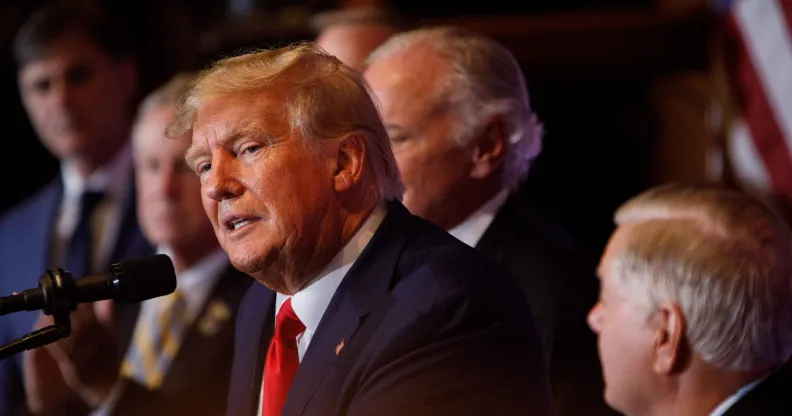
The Shocking Ethics of Political Advertising: Lessons from Trump’s Anti-Trans Ad Campaign
Ethics often take a backseat in the high stake’s world of political advertising, where emotional appeals and persuasive tactics are paramount. Donald Trump’s recent anti-transgender advertisement campaigns offer a striking example of the tightrope political advertising campaigns walk—seeking to energize their base while risking backlash and alienation from the broader public.
Let’s dive deep into the details and understand the key ethical issues surrounding this campaign and explore what lessons can be learned for future political advertising. Let’s start-
Decoding Trump’s Anti-Trans Ad Campaign

The anti-trans ads primarily focus on portraying transgender rights and inclusivity as threats to traditional values. By framing the issue as a cultural battleground, the campaign taps into fears about societal change. Claims about transgender individuals’ participation in sports or access to healthcare are often exaggerated or misleading, designed to provoke emotional reactions rather than inform viewers.
These ads are not new in their approach. Political campaigns throughout history have targeted minority groups to rally specific voter bases, exploiting societal prejudices to gain traction. However, the stakes in this case are uniquely high. The transgender community already faces significant discrimination, and such campaigns exacerbate these challenges, leading to potential real-world harm. Here are the ethical concerns that are relevant to political advertising-
Exploitation of Vulnerable Groups: Political ads often exploit societal fears for political gain. By targeting transgender individuals, Trump’s campaign amplified existing prejudices and spread misinformation about gender-affirming care. Such tactics risk further marginalizing an already vulnerable group.
Misinformation and Fear-Mongering: The campaign’s use of sensationalist claims about transgender policies feeding into societal fears exemplifies a common but unethical advertising practice. Spreading misinformation undermines informed decision-making, a cornerstone of a healthy democracy.
Polarization of Public Discourse: By focusing on contentious cultural issues, Trump’s ads fueled societal divisions rather than fostering constructive dialogue. This “us-versus-them” narrative has broader implications, as it often leads to gridlock and prevents meaningful policy discussions.
Impact on Democratic Processes: Political advertising is intended to inform voters, but unethical practices such as targeting specific demographics with incendiary messaging can distort the democratic process. Instead of engaging voters on substantive policy issues, such campaigns often resort to emotional manipulation.
Lessons for Ethical Political Advertising
While Trump’s campaign exemplifies the pitfalls of unethical political advertising, it also provides a blueprint for what not to do. Here are some lessons political advertisers should consider:
Prioritize Transparency and Truth: Ethical political advertising should provide accurate information, allowing voters to make informed decisions. Fact-checking and responsible messaging should be non-negotiable in any campaign.
Avoid Targeting Vulnerable Communities: Campaigns must recognize their responsibility to uphold the dignity of all individuals. Using marginalized groups as political pawns undermines not only the values of equality but also the integrity of the democratic process.
Focus on Constructive Messaging: Rather than exploiting societal fears, campaigns should aim to present solutions to pressing issues. Positive and inclusive messaging can inspire voter engagement without exacerbating divisions.
Promote Inclusive Policies: Political advertisements should reflect values of inclusion and respect for diversity. Candidates have an opportunity to unite their constituencies rather than deepen cultural divides.
How media platforms react to such events
Media platforms also bear significant responsibility in mitigating unethical political advertising. Social media giants like Facebook, Instagram, and X (formerly Twitter) have become critical players in disseminating political messages. However, their policies often allow misleading or harmful content to flourish.

In response to Trump’s anti-trans ads, LGBTQ+ advocacy groups called on platforms to tighten their regulations and reject content that promotes hate or misinformation. While some platforms have made strides in fact-checking and content moderation, the inconsistency of these efforts remains a concern. Clearer guidelines and stricter enforcement are essential to curbing the spread of unethical ads.
Public reception and backlash
Trump’s anti-trans campaign has drawn significant criticism from human rights organizations, LGBTQ+ advocacy groups, and progressive political figures. Critics argue that such ads perpetuate harmful stereotypes and distract from pressing political issues. On the other hand, Trump’s supporters defend the ads as a legitimate expression of policy concerns, reflecting broader cultural anxieties.
Polling data indicates that younger voters, particularly Gen Z and Millennials, are increasingly opposed to such divisive tactics. These demographics value inclusivity and diversity, viewing targeted political ads as outdated and harmful. However, the impact on older, more conservative voter bases may differ, underscoring the deep polarization in American politics.
Case Studies: Ethical Political Campaigns
To contrast with Trump’s approach, we can look at campaigns that exemplify ethical political advertising:
Barack Obama’s 2008 Presidential Campaign: Obama’s ads emphasized hope, unity, and a vision for the future. By focusing on constructive messaging and avoiding attacks on marginalized groups, the campaign energized a diverse electorate and set a standard for positive political advertising.
New Zealand’s COVID-19 Response Campaigns: These ads prioritized transparency, scientific accuracy, and inclusivity, helping the public navigate a global crisis. Their success highlights the importance of fostering trust through honest and respectful communication.
So, what are the broader implications
The ethics of political advertising extend beyond individual campaigns. As voters increasingly rely on digital platforms for information, the stakes of ethical advertising have never been higher. Misleading or harmful ads can erode trust in political institutions and exacerbate societal divisions. Conversely, ethical advertising can strengthen democracy by fostering informed and engaged citizens.
Trump’s anti-trans campaign serves as a cautionary tale for the industry. While such tactics may energize certain voter bases in the short term, they risk long-term damage to societal cohesion and the democratic process. Political advertisers, candidates, and media platforms must collectively commit to raising ethical standards.
Cut to the chase
Political advertising remains a powerful tool for shaping narratives and mobilizing voters. However, with great power comes great responsibility. The lessons from Trump’s anti-trans campaign underscore the need for ethical vigilance and a commitment to values that strengthen, rather than divide, our democracy.


